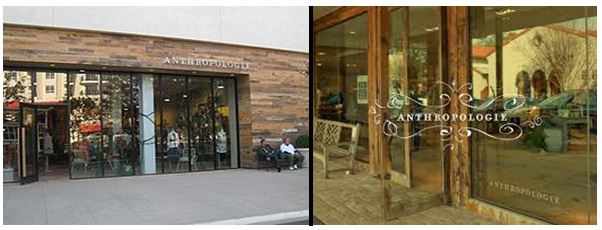Company’s Background
With its first retail store in Wayne, Pennsylvania in 1992, Anthropologie shifted from Urban Outfitters Company that was inaugurated in 1970 by Dick Hayne. Notably, before the opening of Anthropologie, the product was being vended at Urban Outfitters Stores, as it was the first outlet. The company, just like Free People Retail Chains and Urban Outfitters Company, has its main office in Philadelphia, Pennsylvania.
It is worth noting that Free People Retail Chains and Anthropologie operate under the same management; they have similar fervent staffs, as well as same emotional attachment with their clienteles (Farfan par. 1). According to Anthropologie: Our Story (par. 3), the mission statement of the company is grounded on building a strong emotional attachment with the customers by creating environments that appeal to the emotions of the clienteles.
Anthropologie’s Brand Image
The company’s brand has undergone a notable evolution into the Anthropologie stores. The company boasts of its unrivalled status, as it remains an attractive purchasing store for women desiring a curated combination of attires, gifts, accessories, as well as household beautifications. Markedly, these product varieties mirror the buyers’ personal tastes and preferences, thus fuelling their styles and passions from art to fashion to entertainment.
The store has over 185 outlets across the UK, Canada, and the US; it reserves great commitment in providing the customers with signature goods and unrivalled services. The company has also executive branches in Edinburgh, Chelsea, and London in the UK.
As a way of ensuring global presence, the store opened the online platform – anthropologie.com (Anthropologie: Our Story par. 1). The picture below shows Anthropologie’s store in Glendale, California. Evidently, the uniqueness is also seen in the appearance, with 10-12,000 square feet to 15-18,000 square feet.

Demographic and Psychographic of Anthropologie’s Target Customers
Unlike most profit-making organizations, Anthropologie has never advertised its products and services on television commercials or in any print materials (Anthropologie: No Advertising, No Problem par. 1). It relies on the social media and the real outlets to develop and enhance its link with customers, as it believes that the brands can speak for themselves.
According to Southerland (par.1), Anthropologie has been at its best in targeting customers in Buckhead, Santa Monica, and Beverly Hills who does not fancy putting on similar clothing or beautifying their homes with similar materials as everyone else. In this aspect, the retail store focuses on the upscale customers. In terms of age as a demographic factor, Anthropologie targets a 30 to 40-something wealthy urban duo who wants an exclusive and unique product – a product that is totally different from those of the masses (Southerland par. 2).
With its variety of merchandise, Anthropologie has been able to attract numerous affluent couples across India, Far East, and Europe. Remarkably, the Urban Outfitters has been targeting 18 to 28 years old graduates, who still leave in their initial apartment. In a serial manner, Anthropologie targets well-established persons in the next phase of their lives, that is, those between 30 and 40 years. In terms of lifestyle as a psychographic factor, the company targets succeeders who fall in top management.
This category fancies brand selection based on prestige and are enticed by protective and unique brands. From the analysis of production style, Anthropologie offers products that meet the needs and desires of the affluent people in their 30s and mostly residing in suburban and urban areas (Anthropologie: No Advertising, No Problem par. 6).
The target customers like being unique and independent in their ways of doing things. In addition, this group drives their interests and satisfactions from the uniqueness of their products and ways of life; they prefer owning a product that would be a discussion piece among people (Southerland par. 4). The women customers are educated, holding prestigious positions, thus withdrawing weighty salaries. From this point of view, the target customers are very aware of their tastes and preferences.
To the Anthropologie women who have settled in their jobs, prices are not of much concern, and, therefore, their purchases are all about the design. Additionally, these buyers like travelling to adventure into new places in order to obtain new fashions. Olsen (par. 1) notes that these females like practicing yoga, and have great interest in Chinese culture and a collection of historic musical instruments; they are wealthy, but not materialistic.
The Likely Target Customers of the Men Collection
The different and distinctive nature of Anthropologie’s products has been the reason for the company’s reluctance to advertise. Attempts to advertise will bring in new customers from across the social class, thus eroding the distinction that the products initially had (Anthropologie: No Advertising, No Problem par. 8). If the company was to target men with its same marketing approach, well-educated men of between the age of 35 and 45 years will be the main target.
Clearly, this age bracket is already settled in their careers, and is taking home decent salaries. Besides, the target group will be living in affluent regions; therefore, they can easily purchase expensive products because of their uniqueness. Their high lifestyles are due to the high job ranks that they hold. From this dimension, Anthropologie will automatically stock such collections for men of between 35 and 45 years with high level of education, living high lifestyles, and already settled in their jobs.
Works Cited
Anthropologie: No Advertising, No Problem. 2013. Web.
Anthropologie: Our Story. 2014. Web.
Farfan, Barbara. Anthropologie Mission Statement – Passionate Employees, Customer Connection. 2014. Web.
Olsen, Erica. Anthropologie, a Nationwide Retail Store Resources. 2007. Web.
Southerland, Randy. Anthropologie’s Cultured Approach to Style. 2000. Web.